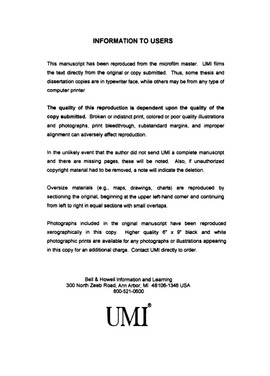| dc.contributor.advisor | Kaid, Lynda L., | en_US |
| dc.contributor.author | Aust, Philip Jerold. | en_US |
| dc.date.accessioned | 2013-08-16T12:31:09Z | |
| dc.date.available | 2013-08-16T12:31:09Z | |
| dc.date.issued | 2000 | en_US |
| dc.identifier.uri | https://hdl.handle.net/11244/6035 | |
| dc.description.abstract | From these conclusions, recommendations are made first to the organization in light of the results, and second to communication scientists committed to extending organizational identity research. The three recommendations to the organization include: First, it is in the United AIA's best interest to recognize that its identity already exists. Second, United can benefit by insuring that its internal and external messages form a collective voice by which the organization is known. And third, it is in United's interest to determine what values it desires to present as its character. | en_US |
| dc.description.abstract | A content analytic method is developed for determining communicatively the identity of an organization based on its transmitted values, and a case study is enacted examining the identity of a five-year old organization: The United Church of God, an International Association (AIA). Findings of the longitudinal analysis distinguish that United AIA's OI communicated the following core values with highest frequency: family security, true friendship, and being helpful most often; obedience and being ambitious to a lesser degree; and equality and mature love the least. Further, results indicate United's temporal OI consists of the communicated values true friendship, ambitious, helpful, true friendship, and obedience in its fifth and most recent year of operation. | en_US |
| dc.description.abstract | Based on the limitations of this research, social scientists should recognize the ways an epistemological foundation affects a study's results and strive to expand the value dictionaries used here. Ultimately, this dissertation provides communication scientists and business professionals a precise method for assessing an organization's identity based on the meaning of its messages. | en_US |
| dc.description.abstract | Technological advancements and globalization have prompted many contemporary organizations to consider who they are from an internal and external perspective. This phenomenon, termed organizational identity (OI), has resulted in social scientists and C.E.O.s alike pursing ways to ascertain those core, enduring, and distinct features unique to any institution. Based on a void in the research, this dissertation advances that an organization's identity is best recognized by its communicated values (CV) transmitted within it borders and to its public. Given this premise, two research questions are formulated: "Which communicated values characterize an organization's identity emergence over time?" and "Which values characterize an organization's temporal identity?" | en_US |
| dc.description.abstract | Seven conclusions regarding United are delineated based on the findings from the content analysis. They include: (a) United's organizational identity continues to expand based on the increasing number of CVs communicated in its documents, (b) United's OI substantiates a distinct value structure, (c) United's mission statement, its Fundamental Beliefs statement, establishes the organization's identity as valuing love from the outset, (d) over its history, United AIA's internal organs (i.e., its leadership letters and magazine articles) have placed a premium on the CV family security, (e) from an external perspective, United has most frequently transmitted the CV true friendship during its history, (f) overall, United AIA has demonstrated a consistent set of communication values in its development, and (g) United's temporal identity has placed emphasis on the CVs: family security, being helpful, true friendship, ambition, and wisdom. | en_US |
| dc.format.extent | ix, 147 leaves ; | en_US |
| dc.subject | Mass Communications. | en_US |
| dc.subject | Organizational behavior Case studies. | en_US |
| dc.subject | Sociology, Social Structure and Development. | en_US |
| dc.subject | Churches of God, Seventh Day Case studies. | en_US |
| dc.subject | Speech Communication. | en_US |
| dc.subject | Religion, General. | en_US |
| dc.subject | Corporate culture Case studies. | en_US |
| dc.subject | United Church of God, an International Association. | en_US |
| dc.subject | Group identity Case studies. | en_US |
| dc.title | Communicated values as indicators of organizational identity: An examination of the United Church of God, an International Association's first five years. | en_US |
| dc.type | Thesis | en_US |
| dc.thesis.degree | Ph.D. | en_US |
| dc.thesis.degreeDiscipline | Department of Communication | en_US |
| dc.note | Source: Dissertation Abstracts International, Volume: 61-09, Section: A, page: 3412. | en_US |
| dc.note | Chair: Lynda L. Kaid. | en_US |
| ou.identifier | (UMI)AAI9988311 | en_US |
| ou.group | College of Arts and Sciences::Department of Communication | |
